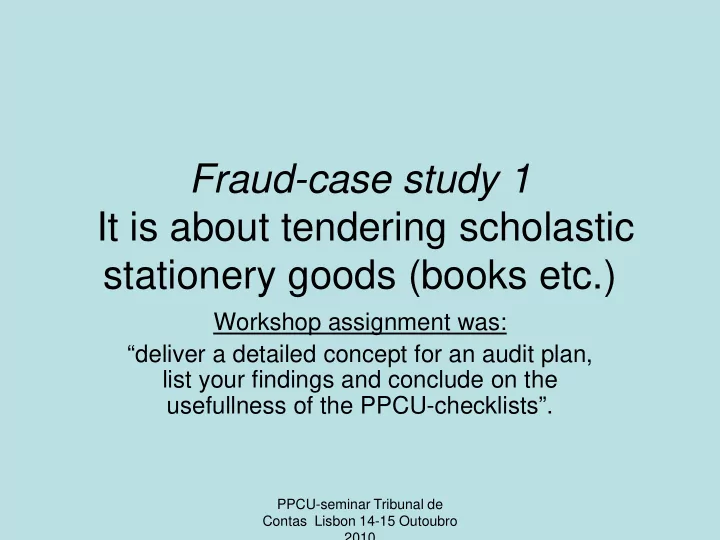

Fraud-case study 1 It is about tendering scholastic stationery goods (books etc.) Workshop assignment was: “deliver a detailed concept for an audit plan, list your findings and conclude on the usefullness of the PPCU-checklists”. PPCU-seminar Tribunal de Contas Lisbon 14-15 Outoubro 2010
Procurement characteristics Authorities policy objective is: ” to enlarge tender-opportunity for small(er) companies” Why this policy? “ authority wants to empower previously disadvantaged persons” • In practice: the small companies take awarded tenders to major suppliers! PPCU-seminar Tribunal de Contas Lisbon 14-15 Outoubro 2010
How to audit the process and the outcome of tender? Make a detailed audit plan: • Determine your audit objective(s) • What do you want to deliver? • What to do, to enable deliverance? • How to proceed? • Timing PPCU-seminar Tribunal de Contas Lisbon 14-15 Outoubro 2010
Workshop results Conducting an audit plan Step 1 • Determine type of audit (compliance audit) • Select fully skilled auditors and/or hire independent engineering/contracting expertise • Check whether alligations are true or false • Check whether the policy is national or just tender-related and whether standards are clear and made public to all relevant actors PPCU-seminar Tribunal de Contas Lisbon 14-15 Outoubro 2010
Audit tasks-1 Step 2: audit tasks • Collect and examine all available and time related “in house” documents and the officials involved (preparation phase) • Contact responsible management of department • What standards and criteria are relevant and transparant (and known to all stakeholders)? • Check the procedure(s): draft of tender, who had decisive and approving powers? Same or changing officicials? • Tenderers that were not awarded contract on lowest bid: find out why! PPCU-seminar Tribunal de Contas Lisbon 14-15 Outoubro 2010
Audit tasks-2 • Check information and background of bidders to detect collusion risks by: - asking for tax clearance certificate; - checking commercial register and tax department tender data (and focus on linked information to other firms, tenders and main suppliers and there stakeholders (to detect suspicious connections); - how long in business? - make a list of personal and managers employed - security check • Check the authenticity/genuinity of all documents . PPCU-seminar Tribunal de Contas Lisbon 14-15 Outoubro 2010
Audit tasks-3 • Check indentity of contracting officials (same as always or not) • Check independency of tendering committee members and ex-post monitoring committee members • Use all available independent resources to get 100% evidence that is needed to give proove of fraude or abusive activities/constructions PPCU-seminar Tribunal de Contas Lisbon 14-15 Outoubro 2010
Audit tasks-4 What to audit? • Authenticiy of documentation • Position and role of officials • Former cases of collusion same tenders involved • Date of business start of “new tenders” • Internal controls were in place and were carried out indepedently (not connected to officials) PPCU-seminar Tribunal de Contas Lisbon 14-15 Outoubro 2010
Preliminary conclusion on the “usefullness of PPCU-guidelines” in this case ? Guidelines ( pg . 115-119-165-168-177 GL ) offer a good and practical framework but………….. >>Auditors should always trust and use there creative expertise and rely on any proven basic methods to detect anomalities that could point to collusion situations that may conflict with national and EU-regulations or damage state interests! << PPCU-seminar Tribunal de Contas Lisbon 14-15 Outoubro 2010
Recommend
More recommend